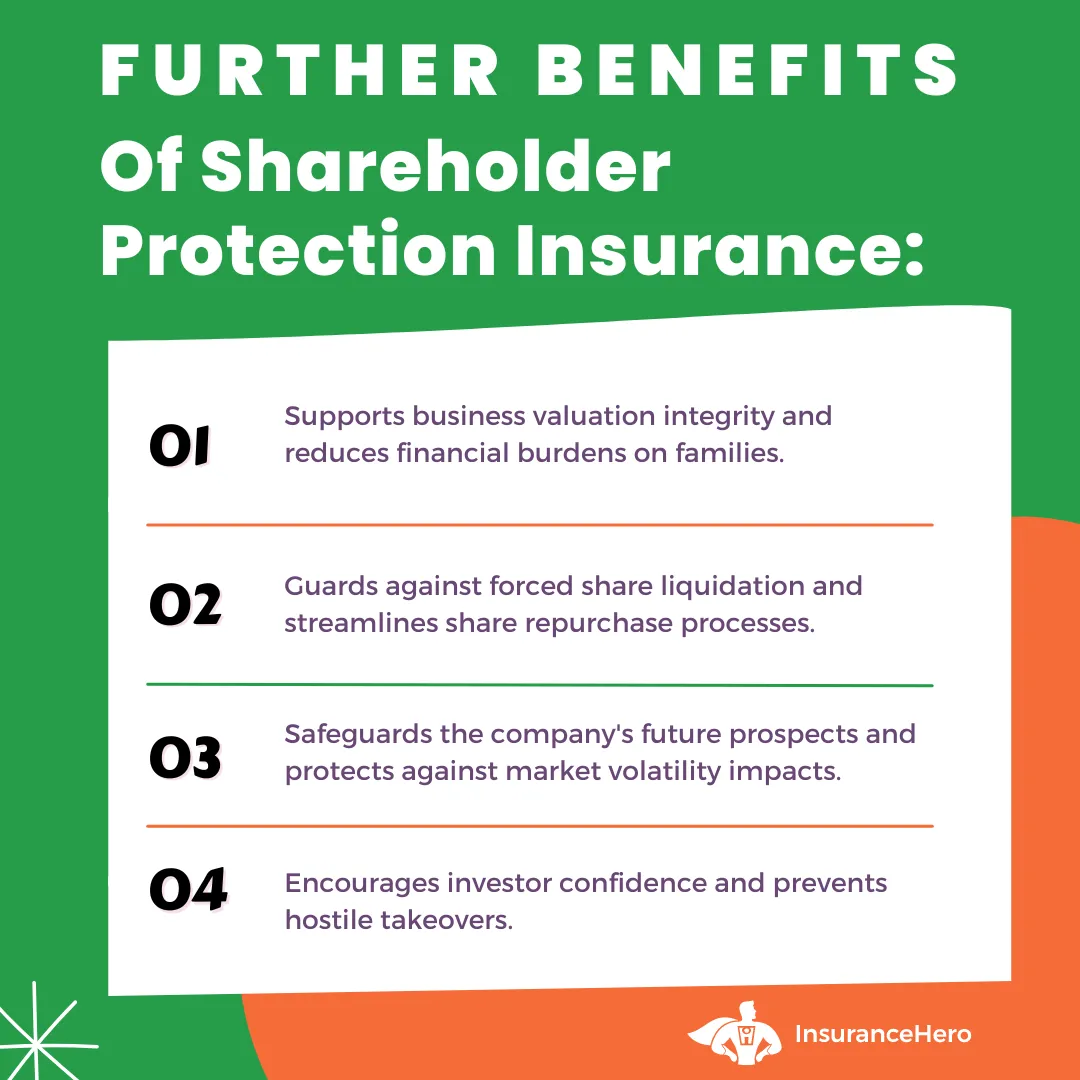Shareholder Protection Insurance Guide

Have you considered the consequences for your company if a substantial shareholder suffered a severe injury, illness, or death?
Would the other shareholders be able to purchase the shareholding? If not, what would be the consequences?
This detailed guide will explain how shareholder protection insurance works and why it can provide certainty for your business.
The Smartest Way To Protect Your Business, Shareholders And Employees. Get A Free Shareholder Protection Quote today.


The tables below aim to provide a concise overview of Shareholder Protection Insurance. The rest of our guide explains the core fundamentals in more detail.
Insurance Hero has years of experience in business protection. We are confident we can find the right coverage for your business’s unique requirements.
Overview of Shareholder Protection Insurance:
| Feature | Description |
|---|---|
| Definition | A type of insurance that provides the funds for remaining shareholders to buy the shares of a deceased or critically ill shareholder, ensuring business continuity. |
| Purpose | To prevent shares from falling into unwanted hands and ensure the deceased’s family receives fair compensation. |
| Benefits | Maintains control within the remaining shareholders, provides financial stability, and minimises disruption. |
Types of Agreements in Shareholder Protection:
| Agreement Type | Description |
|---|---|
| Cross-Option Agreement | Allows the surviving shareholders or the deceased’s estate to initiate the buy-sell process. |
| Double Option Agreement | Similar to Cross-Option but specifically designed for life cover scenarios. |
| Single Option Agreement | Used for critical illness situations, providing flexibility in share purchase. |
Tax Considerations for Shareholder Protection Insurance:
| Aspect | Description |
|---|---|
| Income Tax | Generally, there is no income tax liability on the proceeds from the policy. |
| Capital Gains Tax (CGT) | It may apply if shares are sold for more than their purchase price. |
| Inheritance Tax (IHT) | Properly structured policies can avoid IHT, especially with business property relief. |
Factors Affecting Cost of Shareholder Protection Insurance:
| Factor | Impact |
|---|---|
| Age of Shareholder | Older shareholders typically incur higher premiums. |
| Health Status | Pre-existing conditions can increase premiums. |
| Lifestyle | High-risk lifestyles may lead to higher costs. |
| Coverage Amount | The level of cover required directly influences the premium. |
Choosing a Provider for Shareholder Protection Insurance:
| Consideration | Description |
|---|---|
| Provider Reputation | Established insurers with a track record of reliability are preferred. |
| Policy Flexibility | Policies that offer customisation to fit specific business needs. |
| Cost-Effectiveness | Competitive premiums with comprehensive coverage. |
| Advisory Services | Providers or brokers offering expert advice to tailor policies accurately. |

What Is Shareholder Protection Insurance?
Shareholder protection provides business shareholders with the funds to purchase one another’s shareholding should one become unable to work again due to death, injury, or illness.
It is a life insurance-based protection flexible enough to include other elements, such as terminal illness and critical illness coverage.
How Does Shareholder Insurance Work?
Shareholder protection pays out a financial amount if the covered shareholder dies or is diagnosed with a critical or terminal illness. The lump sum enables the other shareholders to purchase the shares of the deceased shareholder.
Calculations are based on various factors to determine the required premium level. An insurer will consider the policyholder’s age if they have underlying medical problems and lead a higher-risk lifestyle.
Does Our Business Need Shareholder Protection?
To decide whether your business needs shareholder protection in place, consider the following two points:
- Should the key shareholder die, will the remaining business owners be able to retain control of the business?
- Does your business have a shareholder agreement about what would happen if a business holder became critically ill or even died?
What Are the Advantages of Shareholder Protection?
When a shareholder dies without making a decision about their shareholding, the company shares typically pass to the beneficiaries of their estate, who have to make decisions.
- It includes either taking the proceeds from the company’s shares or selling the shares.
- Taking over the shareholder’s position within the company
With shareholder protection insurance, the family or a family member is not forced into a decision because they will receive a lump sum payout for their shareholding, distributed amongst the other shareholders.
Protect Your Business For Less – Compare & Save – Policies From UK’s Leading Insurers


With the cover in place, it avoids the following potential problems:
- The remaining shareholders will not acquire a sleeping shareholder who adds no value to the business.
- Surviving shareholders may lose control of the company.
- The family is unhappy as they have no control over the business profits they require for income.
How Do I Set Up Protection?
Businesses must have the correct valuation to set up shareholder insurance, which an adviser specialising in this cover must undertake.
Valuing companies can be complicated, as every firm is different and its sector has an impact. Considerations to correctly value the business include profit and cash flow analysis.
Insurance Hero has extensive experience in providing share purchase protection. Our professional team can help you get a quote tailored to your business’s needs. Contact us today at 0203 129 8866.
How much is shareholder protection insurance?
The cost of shareholder protection insurance can vary as many elements make up insurance quotes, affecting premium levels and the sum assured.
Considerations for insuring a shareholder include:
- Do they have a high-risk lifestyle, such as participating in extreme sports?
- Do they have any underlying medical conditions?
- How old is the shareholder?
- Are they a smoker or a non-smoker?
- What is the length of the policy required?
- What level of cover is required?
- Are critical illness and terminal illness a requirement?
Let us consider the following examples to provide an idea of cost:
For a 10-year shareholder protection policy, to insure a 34-year-old non-smoker with no underlying medical problems will cost around £7 a month. For a 53-year-old with the same lifestyle criteria, the monthly cost rises to approximately £26.
If critical illness cover is added to the life policy, the cost rises to £32 a month for the 34-year-old and £155 a month for a 53-year-old shareholder.
How Is Our Business Valued for Shareholder Insurance?
It can take time to value a business for shareholder protection as different considerations come into play. Depending on the complexity of the company’s requirements, a specialist insurance advisor and, if necessary, a tax expert will need to review the matter.
Insurance Hero can help at each step and has helped hundreds of UK businesses over the years.
At a minimum, the following need to be looked at:
- A full cashflow analysis of the business
- Calculating all cash deposits and assets as a multiple of net profit
- A detailed analysis of the business’s profits and how they are changing over time
For further details on shareholder protection insurance and protecting your business, contact Insurance Hero today. Our experienced team of professionals can provide an accurate quote that aligns with your company’s needs.
Shareholder Protection Insurance Tax Treatment. Is Shareholder Protection Insurance Tax Deductible?
Shareholder protection insurance is a more complex type of cover. Not only does a valuation require the services of a specialist adviser, but crucial tax considerations must be taken into account before a shareholder protection insurance policy is implemented.
Three methods exist for purchasing shareholder protection, and each has a specific tax position in HMRC’s eyes.
Taxation Methods:
- Life of Another: Each shareholder pays for the insurance from post-tax income, usually with no tax implications for premiums or payouts. However, due to the complexity of policy management, it is practical for only a limited number of shareholders.
- Company Share Purchase: The company insures each shareholder receiving benefits to buy back shares without the premiums being deductible as a business expense due to not meeting the ‘wholly and exclusively for the purposes of trade’rule. A cross-option agreement is necessary to avoid future tax complications.
- Own Life Policy Under Business Trust: Shareholders insure their own lives, placing policies in a business trust for fellow shareholders. If the company pays, premiums may be deductible as a business expense, but shareholders face P11D or benefit-in-kind taxes. Individual shareholder payments come from post-tax income, typically without further tax implications.
It is vital to get professional advice before putting in place the correct type of policy for your business, including its impact for Inheritance Tax purposes.
Further Tax-Related Considerations
What about Premium equalisation?
Equalising premiums ensures that shareholder protection policies are set up commercially and that the cost of cover is equally divided among all the business’s shareholders.
In most cases, the premium paid by each shareholder will correlate with the level of protection needed to cover their shareholding percentage in the business.
For HMRC, premiums may need to be equalised in some instances to prevent unequal premiums from being viewed as a transfer of wealth, with shareholders paying the highest premiums subsidising minority shareholders paying the lowest premiums.
Cross-option agreement
Also called a double option agreement, it is a legal arrangement between the insured shareholder’s estate and the surviving shareholders. It sets out a schedule for who will purchase the shares and at what price.
The arrangement provides certainty by setting out the percentage allocation for each individual shareholder and the amount they will receive from the estate.
Shareholder protection insurance benefit in kind
Benefits in kind are remuneration made by a business to a shareholder or employee above their salary. It can include fringe perks such as a company car, private medical insurance, or even food vouchers to spend in a local store.
Shareholder business protection is complex insurance, and how you set it up dictates whether HMRC classifies it as a benefit-in-kind, which affects tax. Getting guidance from a specialist such as Insurance Hero is vital before implementing any policy.
Other Types of Insurance Protection for Your Business
Keyman Insurance
Keyman insurance is a policy that pays a lump sum to a company if a key member of staff dies. If critical illness cover is part of a policy, protection is provided should the insured be unable to return to work due to illness or injury, not just death.
The payout from keyman cover can be used for several purposes, including creating a buffer against any fall in profits following the loss of a staff member or the cost of recruiting and training a replacement employee.
Business Loan Protection Insurance
If a business owner dies or becomes unable to work, the lender may recall corporate debt tied to a business founder or shareholders if the loan is linked to personal finances.
To protect against this, business loan insurance can match the outstanding debt with a cash payout to repay the debt should the insured die.
Many corporate lenders insist that a business take out loan protection insurance before funding is in place.
Relevant Life Insurance
Relevant life insurance is financial protection beyond a salary that a company offers its employees to provide a financial cushion for their loved ones should they pass away in service.
The cover is written into trust, and a lump sum is paid to the employee’s dependents. The lump sum can be used to pay off outstanding debts or to help the family maintain a lifestyle and live comfortably day to day.
For an employer. Providing a product like relevant life cover to their employees demonstrates a level of care beyond merely providing a salary.
Business Partnership Protection Insurance
If you are in a professional partnership with fellow partners, if one of the partners were to pass away or could not return to work, issues, including retaining control and keeping the partnership going, may become a problem.
Business partnership protection insurance is a product tailored to the partnership business model. It provides the remaining partners with a payout sufficient to maintain a controlling interest and buy out the absent partner’s interest in the partnership.
Summary
Shareholder protection can increase your business’s certainty in the event of something happening to one of your fellow shareholders. Importantly, it provides the other shareholders with the financial means to retain control of the company.
If you want peace of mind that your business will not fail due to the death or illness of a fellow shareholder, consider shareholder protection insurance.


